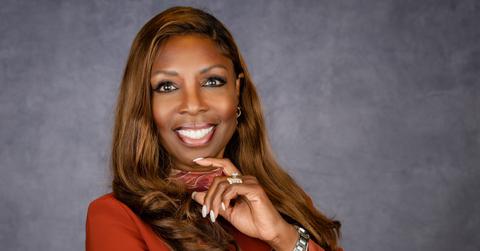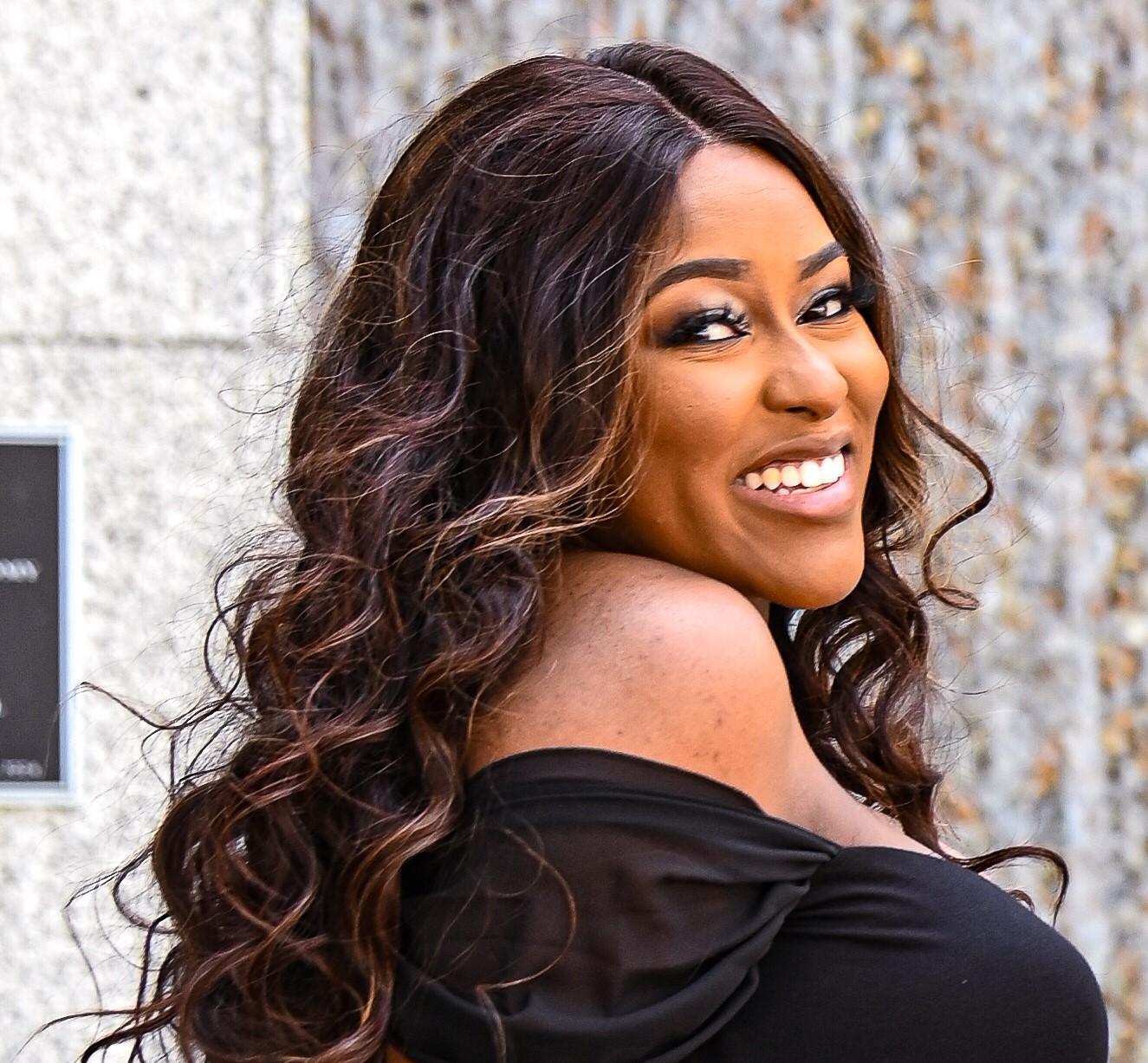Daphne E. Jones is equal parts daring and diligent. Daphne’s career has spanned decades including executive leadership roles in engineering at Fortune 50 companies like IBM, GE, Hospira (Now Pfizer), and Ortho Clinical Diagnostics (Johnson & Johnson).
As a business leader, much of her career was dedicated to business transformation and process improvement —today her day-to-day has shifted out of the workplace as she has retired, but her goals have remained the same, to help people and to make the complex simple.
From her book ‘Win When They Say You Won’t: Break Through Barriers and Keep Leveling Up Your Success’ to her business focused on getting more executive leaders board-ready, Daphne wants to take her lessons from corporate America to teach the next generation how to reach their career goals.
Her Agenda: You’ve had such a successful career with lots of different titles, but what I found interesting is that someone told you you should go to secretary school. Talk to me about reckoning with the idea of going to secretary school versus what you actually wanted to do.
Daphne E. Jones: It was a conflict for me because my mother always told me that whatever has my mind has me. If education has my mind, then I’m gonna be well-educated. If that silly boy down the street has my mind that I’m gonna be that silly girl sitting next to that silly boy. So she was focused on education and I skipped first grade because she really hammered math and reading into me.
So on one hand it was her like, push, push, push. You can do it, you can do it. And then on the other hand was this man who was clearly paid to advise students. When you have somebody like that, then you sort of say, well, he must know what he is talking about.
And so I was diametrically opposed. I said, okay, well he knows what he is talking about. Let me go ahead and go do this thing. And because I asked him, why haven’t you come to see me about going to college? And he was like, ‘well, yeah, because you shouldn’t be going to college. Black girls don’t really go to college unless they want to become a secretary. You can go to secretary college.’ He said, ‘if you get in, you won’t graduate because you know you’ll probably fail. And if you do happen to graduate, nobody’s going to hire you.’
[To him] I didn’t represent a person who could be the CEO of her own startup or be the highest-ranking African-American in IT for all of General Electric. I didn’t represent that. I represented somebody who could watch his children or cook his food.
It was a dichotomy. [On the one hand, it was] don’t go to college, Daphne. [On the other it was] you can do anything with education. [Ultimately I realized that] he was wrong after I got my bachelor’s degree in three years instead of four, and I got my MBA in one year instead of two.
I’m like you know what? The word is not impossible like he gave me. The word is inevitable. It’s just a matter of time if you put your mind to it and you have the right mindset and the will set. You go to school, you get the skill set, and then you’ll have a skill set for life. I apply that every day of my life.

Her Agenda: Why did you end up pursuing the STEM route over something like communications?
Daphne E. Jones: That’s a great question. I have no idea. If I had known that what I was going into is what we now know as STEM, I would’ve passed out, fainted, then I would’ve quit.
Because I didn’t know, I just knew that I wanted to work for IBM. I got a job offer as a National Bank examiner to go around to the different regional banks like Chicago and wherever all the, the top, it was like seven or 10 regional banks in the country and going around to them.
So I had the IBM job. And I just knew that IBM was the baddest company on the planet. I saw their billboards, copiers, and mainframes and said, ‘God, I wanna work for that company.’ I didn’t know what they did but I know that they train you and they teach you what you need to learn.
I’m like that’s for me. And then I get in there and I’m learning how to cobalt, how to read assembler and binary. I’m like, what am I doing? But if he can do it, sitting next to me, then I can do it.
So I didn’t know that that’s what I was getting into. And sometimes ignorance is bliss.
And I learned how to talk to people. And through my talking to people, they would buy the equipment from me or they would trust me that I would help make sure that the solution that they were getting was actually gonna be right. It wasn’t a pure STEM program all day long, it was also connecting with humans and people to help them get their dream, their vision of what they wanted the technology to do to help them. It became about people more than it became only about STEM.
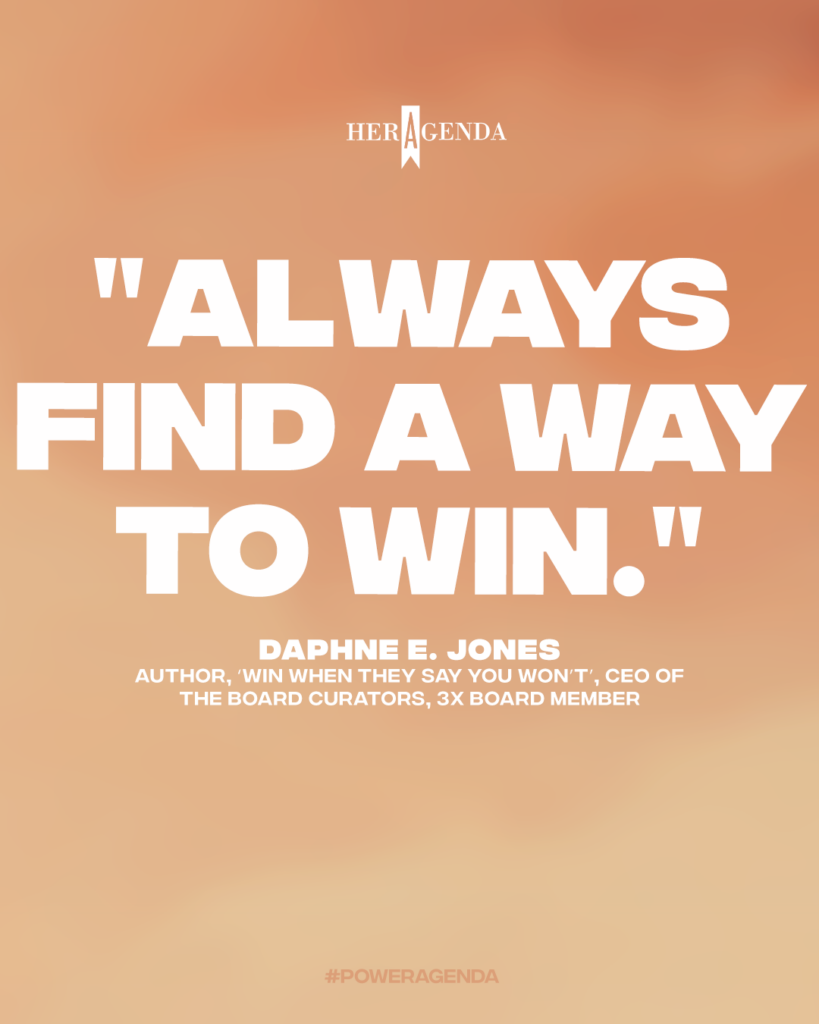
Her Agenda: How did you decide to open up to write this book after this amazing career?
Daphne E. Jones: I started writing the book probably about 13 or 14 years ago, and so I didn’t have it in my mind just to start after my career.
One of the things that I did at IBM was I got promoted to a large systems instructor role. So I was teaching people how to manage and run mainframes. I learned that I love teaching people stuff. But of course, I couldn’t stay in that role forever because it was a transitory role. I could only be there for like a year and a half, two years, and I had to move on and move up.
I could not devote the time to really write the book from beginning to end, cover to cover from top to bottom but I knew that I had it in me. I knew I had to share all this stuff that I’ve [experienced] over the years, including when I was beaten up by a white gang and when my boss would move me away from my team because I had too much power.
And so this, it was in me. I decided that even though all these things happened to me, it was time for me to share with people that this is how you get to the top and this is how you stay there.
I just started asking people who I knew had written books. How did you do it? Where’d you start? Can you introduce me to your publisher? Introduce me to your ghostwriter. Introduce me to all these people that I didn’t know who I needed. One thing led to another and it came out in November 2022.
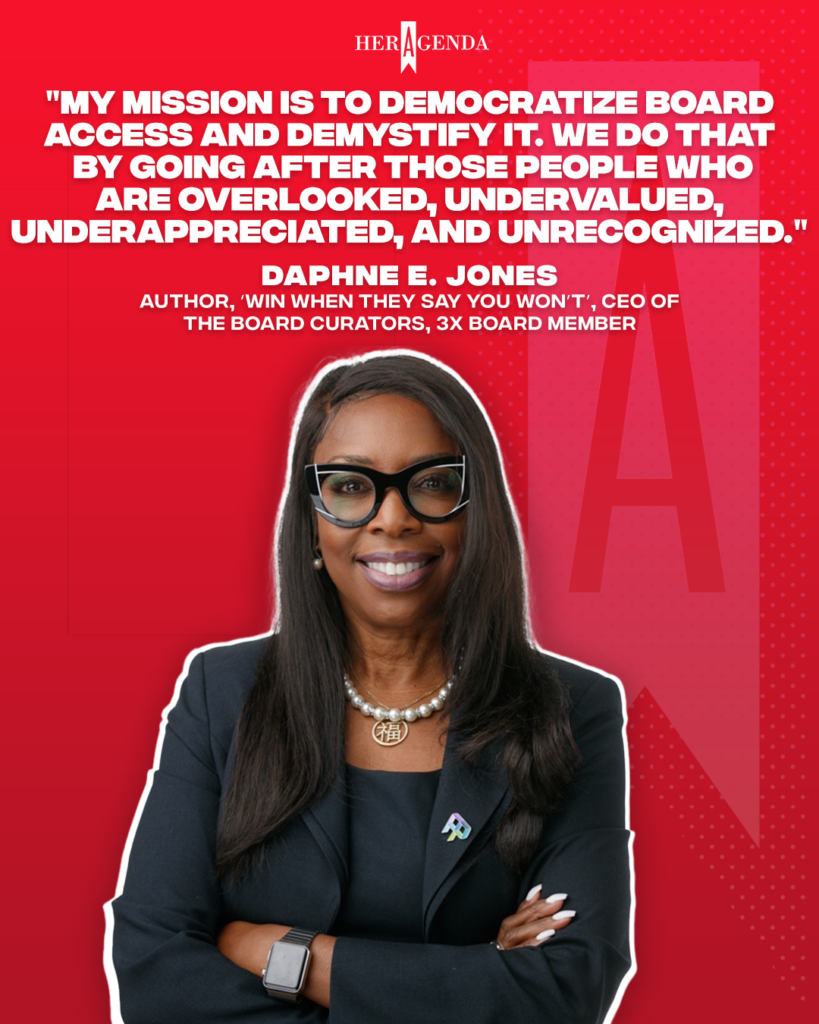
Her Agenda: One of the things that stood out when researching about you, was that you like to use different acronyms. Talk to me about why you kind of use that to teach.
Daphne E. Jones: I believe that one of the strengths that I have is that I make the complex simple. I believe that when you can give somebody three letters or maybe four letters that make up a word, then they understand the concept and then they’ll remember the phrase. It’s not that it’s complicated, but how do you make it like this rolls off your tongue? And so that’s why I did the acronyms.
What I did was I chose to use my technology background, having been a programmer, there’s a cycle that you go through when you want to bake a cake, right? You buy the ingredients, you mix them together, you put ’em in a pan, you cook it, and you frost it. And every time you want to bake a cake, you do those same five things. So when I looked at writing programs, whether it be an app on your phone, all of those apps were developed using a cycle, wash, rinse, repeat, called the systems development life cycle. So every code that’s ever been written, people write using a cycle. They plan it. They build it, they run it, and then they maintain it. That’s the life cycle. So if an app can do that, if an app can be maintained and get bigger and better over time, why can’t we?
Why can’t we, as human beings, learn how to get bigger and better? And that’s where the thought of E.D.I.T. came from. E.D.I.T. is not a software development lifecycle, it’s a professional development lifecycle. So it’s not an S D L C, it’s a P D L C, and it stands for Envision, Design, Iterate, and Transform.
Just like you transform from not having an app To having that app, you can transform from being a person who doesn’t know how to swim to somebody who is transformed into a swimmer. You envision all that stuff. You design your plan, and then you step out there and you try it. You step out and try to go into the swimming pool and learn how to swim for the first time. You go out there and try it and you iterate. You won’t succeed always the first time.
That’s why you iterate. Iterate means you repeat the cycle. You learn from your mistakes, and you go back out there. You never quit. You keep going and then after you iterate enough times, trust and believe, you’ll be a swimmer. You may not be able to be an Olympic swimmer, but you’ll be able to swim and then you figure out, okay, now I learned how to swim.
What else can I go back and do? So you go and you’ve transformed into a swimmer, but you go back to the E and edit and you envision, well, now I want to learn how to be a lifeguard. Okay, so that’s your new vision. And then you design, well, how am I going to become a lifeguard? And then you design that plan, you know, and you take more lessons or whatever, and you try out to be a lifeguard.
Next thing you know, you’re a lifeguard, you’ve transformed, and then you go back and you say, well, maybe I could become a scuba diver. That takes another level of skill. So, you are improving yourself along the way. You are successful because you’ve learned how to envision. You’ve learned how to design a plan and approach. You’ve learned how to stick with it when you iterate, and the next thing you know, you’ve transformed and you haven’t only transformed yourself. You’ve also transformed people around you. People now say, well, boy, how did she do that? Well, she can do it. I know I can do it. You have transformed not only yourself, but you’ve transformed the people who are around you to learn how to win and not quit.
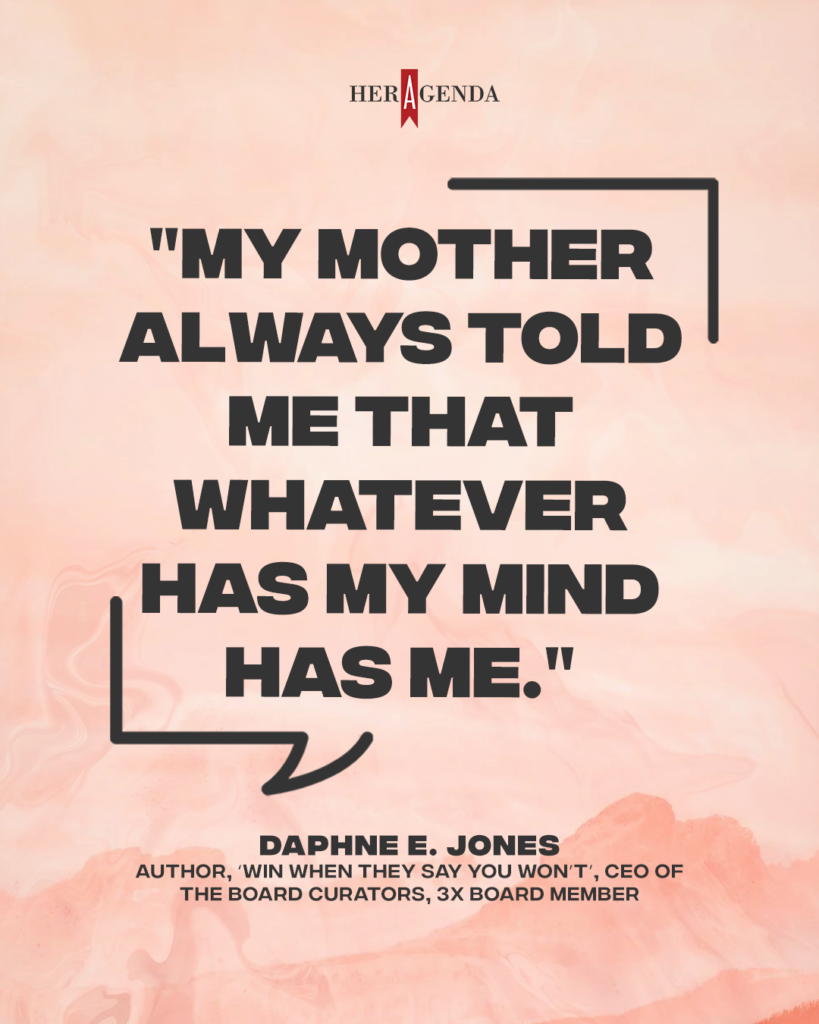
Her Agenda: I like how you’ve broken that down in a way that’s a true framework. One more question, your current work is about getting leaders to be on boards, that’s always a big topic of conversation because we believe we need more representation. So tell me how your company is helping to solve that problem as well as what can our audience do today to set themselves up to be on a board.
Daphne E. Jones: I have a mission-based company, even though it is for profit. My mission is to democratize board access and demystify it. We do that by going after those people who are overlooked, undervalued, underappreciated, and unrecognized. That’s usually women and people of color.
Not only diversity from a race and gender standpoint but also diversity of experiences and function. You can’t have all CEOs and CFOs on a board because there are issues around the supply chain, there are issues around human capital management and the quiet quitting, or the quiet reset, or whatever we want to call it. There are activist investors who want to buy your company up and get rid of the board. So you need people who understand mergers and acquisitions. You need all of that.
I have represented my team as a CIO, a Black lawyer, and a former CEO, so what can people do to get ready? Number one, it starts with the mindset. You have to say, well, in about 10 years, 20 years, 30 years, I want to be on a paying board. And so you start by understanding what a board is and you start by getting on a not-for-profit board.
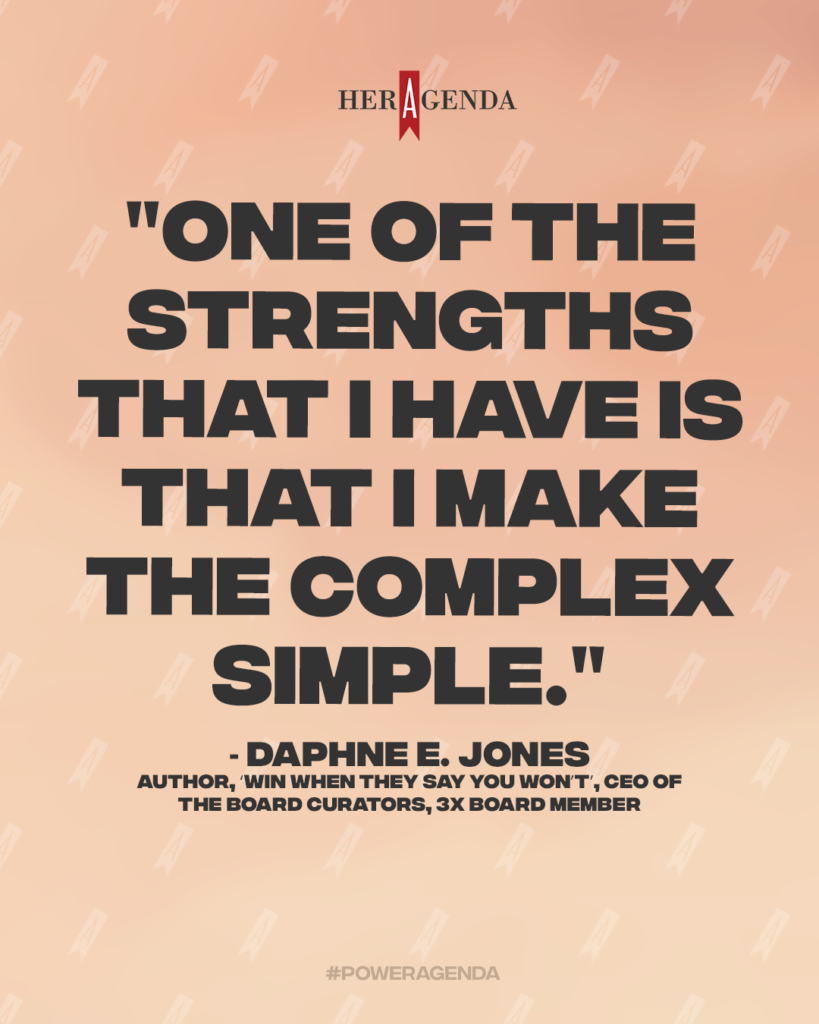
And then number two identify what your superpowers are. Like I said, everybody’s got a strength. Everybody’s got a superpower. If you are great at finance, you’ll be perfect on a board. People need to understand finance, sales, marketing, manufacturing and distribution, and warehousing. You don’t have to be an expert on all of those but understand the value chain of business and how you can speak the language of business.
And I say the third thing is to find a board that you like. Look up Xerox. Look up Google, whatever board, and look at the people that serve on those boards. See the composition and say, okay, I see that person right there. They have my skill. Find somebody that you can get behind and follow them on LinkedIn and find out what they did to get to where they are, follow their background, follow their pedigree, what roles they play, and if they’re close enough to you, you may be able to follow their footsteps as a role model.
My last point is to let the right people know when it’s time when you feel like you are ready to join a board. You let the right people know that you want to join a board. You let your boss know because some bosses don’t let you serve on a board, but if you start with a not-for-profit board, you’ll be fine and while you do that, you’ll get the experience behind you.
[Editor’s note: This has been edited for length and clarity.]

